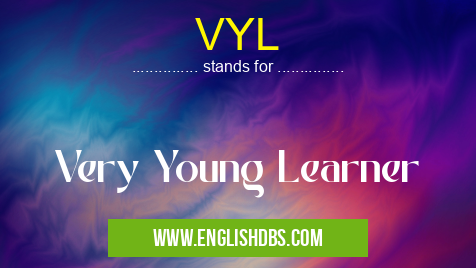What does VYL mean in UNCLASSIFIED
VYL is an acronym used in the world of educational technology and stands for 'Very Young Learner'. This term is often used to refer to students that are aged 4-6 years old, or kindergarten age. These learners can be attending school or participating in online learning experiences. VYLs sometimes require additional support and different approaches than older learners due to their lack of knowledge and understanding when it comes to academics. VYLs often find success with fun activities that make learning fun while still encompassing topics that will help prepare them for their future schooling endeavors.

VYL meaning in Unclassified in Miscellaneous
VYL mostly used in an acronym Unclassified in Category Miscellaneous that means Very Young Learner
Shorthand: VYL,
Full Form: Very Young Learner
For more information of "Very Young Learner", see the section below.
What Does VYL Mean?
The acronym VYL stands for 'Very Young Learner'. It is used by educators, parents, and other educational professionals when referring to learners who are within the age range of 4-6 years old. These young students are preparing for school and needing extra help in understanding basic concepts such as numbers, shapes, letters, etc., in order to get ready for elementary school.
Benefits Of Working With Very Young Learners
Working with VYLs can be a rewarding experience. Educators must use strategies that focus on engagement, accessibility, patience, and creative problem solving when working with these students so they may have a successful experience learning new skills. Teaching a VYL means providing appropriate resources such as visuals or tactile objects which may help them understand topics better than traditional teaching methods would. Additionally, creating fun activities or using music or stories may also assist with further developing the necessary educational skills for elementary school readiness.
Essential Questions and Answers on Very Young Learner in "MISCELLANEOUS»UNFILED"
VYL stands for 'Very Young Learner' and is used mainly by those working within the field of education who are working with children between the ages of 4-6 years old. With appropriate support from educators and parents alike these children can use engaging activities combined with traditional academic principles to foster a positive foundation of knowledge before beginning elementary school.
